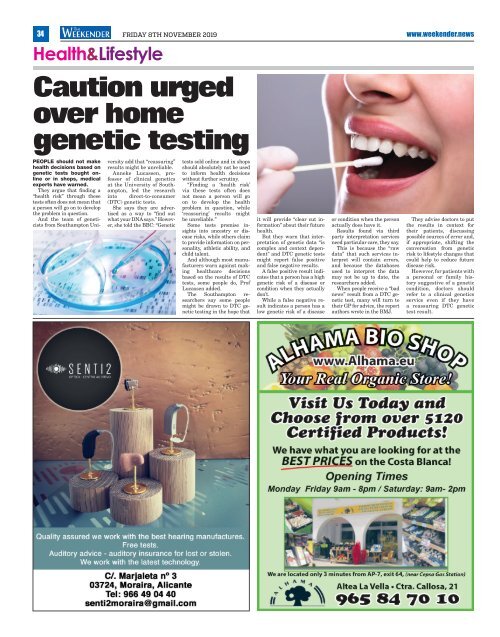You also want an ePaper? Increase the reach of your titles
YUMPU automatically turns print PDFs into web optimized ePapers that Google loves.
34 FRIDAY 8TH NOVEMBER 2019<br />
www.weekender.news<br />
Health&Lifestyle<br />
Caution urged<br />
over home<br />
genetic testing<br />
PEOPLE should not make<br />
health decisions based on<br />
genetic tests bought online<br />
or in shops, medical<br />
experts have warned.<br />
They argue that finding a<br />
“health risk” through these<br />
tests often does not mean that<br />
a person will go on to develop<br />
the problem in question.<br />
And the team of geneticists<br />
from Southampton University<br />
add that “reassuring”<br />
results might be unreliable.<br />
Anneke Lucassen, professor<br />
of clinical genetics<br />
at the University of Southampton,<br />
led the research<br />
into direct-to-consumer<br />
(DTC) genetic tests.<br />
She says they are advertised<br />
as a way to “find out<br />
what your DNA says.” However,<br />
she told the BBC: “Genetic<br />
tests sold online and in shops<br />
should absolutely not be used<br />
to inform health decisions<br />
without further scrutiny.<br />
“Finding a ‘health risk’<br />
via these tests often does<br />
not mean a person will go<br />
on to develop the health<br />
problem in question, while<br />
‘reassuring’ results might<br />
be unreliable.”<br />
Some tests promise insights<br />
into ancestry or disease<br />
risks, while others claim<br />
to provide information on personality,<br />
athletic ability, and<br />
child talent.<br />
And although most manufacturers<br />
warn against making<br />
healthcare decisions<br />
based on the results of DTC<br />
tests, some people do, Prof<br />
Lucassen added.<br />
The Southampton researchers<br />
say some people<br />
might be drawn to DTC genetic<br />
testing in the hope that<br />
it will provide “clear cut information”<br />
about their future<br />
health.<br />
But they warn that interpretation<br />
of genetic data “is<br />
complex and context dependent”<br />
and DTC genetic tests<br />
might report false positive<br />
and false negative results.<br />
A false positive result indicates<br />
that a person has a high<br />
genetic risk of a disease or<br />
condition when they actually<br />
don’t.<br />
While a false negative result<br />
indicates a person has a<br />
low genetic risk of a disease<br />
or condition when the person<br />
actually does have it.<br />
Results found via third<br />
party interpretation services<br />
need particular care, they say.<br />
This is because the “raw<br />
data” that such services interpret<br />
will contain errors,<br />
and because the databases<br />
used to interpret the data<br />
may not be up to date, the<br />
researchers added.<br />
When people receive a “bad<br />
news” result from a DTC genetic<br />
test, many will turn to<br />
their GP for advice, the report<br />
authors wrote in the BMJ.<br />
They advise doctors to put<br />
the results in context for<br />
their patients, discussing<br />
possible sources of error and,<br />
if appropriate, shifting the<br />
conversation from genetic<br />
risk to lifestyle changes that<br />
could help to reduce future<br />
disease risk.<br />
However, for patients with<br />
a personal or family history<br />
suggestive of a genetic<br />
condition, doctors should<br />
refer to a clinical genetics<br />
service even if they have<br />
a reassuring DTC genetic<br />
test result.

















